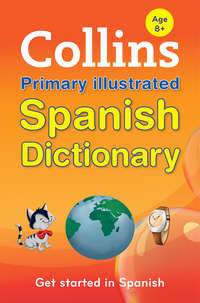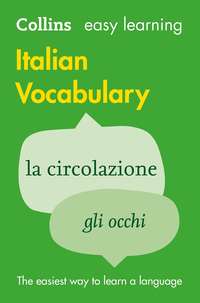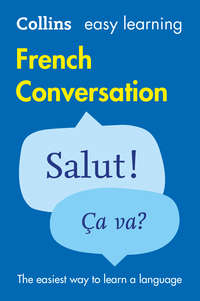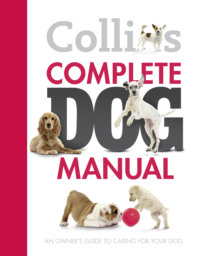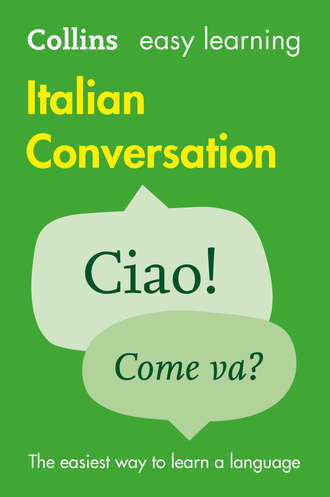
Полная версия
Easy Learning Italian Conversation
Which syllable to emphasize
To make your Italian sound more fluent and natural you need to stress the right syllable. Here are some guidelines:
• Two-syllable words always stress the first syllable, unless the final vowel has an accent:
casa (house)giorno (day)bella (beautiful)due (two)sono (I am)spesso (often)lui (he)oggi (today)• Words with three or more syllables generally have the stress on the next to the last syllable:
inglese (English)finito (finished)andare (to go)andresti (you’d go)venire (to come)supermercato (supermarket)settimana (week)straordinariamente (extraordinarily)• If a word has an accent on the final vowel, it is stressed on the final syllable.
età (age)metà (half)così (like this)perché (why, because)Words of this type include many nouns that end in –ty in English
università (university)curiosità (curiosity)città (city)crudeltà (cruelty)• Two future tense forms always have an accent (I and he/she/it/You):
farò (I’ll do)aspetterò (I’ll wait)sarà (it will be)si divertirà (she’ll enjoy herself)• Some words have the stress on a syllable which is not the last, or the next to the last. In this book we use italics to show when an unexpected syllable is stressed, to help you learn the correct pronunciation.
utile (useful)numero (number)macchina (car)camera (room)subito (suddenly)compito (homework)difficile (difficult)portatile (portable)• It's specially important to notice which syllable you should emphasize when pronouncing infinitives ending in –ere, because they vary. Some, such as avere (to have) and vedere (to see) have normal stress, on the next to the last syllable.
However, there are many important exceptions, for example:
essere (to be)vendere (to sell)scendere (to get off)dividere (to divide)scegliere (to choose)chiudere (to close)BUONO A SAPERSI!
Past participles such as finito and partito always have the stress on the next to last syllable, but similar-looking words such as subito and compito sometimes have the stress on a syllable you wouldn’t expect.
Small talk
Come va? – How are things?
Whether you’re going to be working in Italy or you’re going to spend some time with your Italian-speaking friends, you’ll want to be able to chat with people and get to know them better. The phrases in this unit will help you talk naturally to friends, family and colleagues in a number of everyday situations.
GREETINGS
Just as in English, there are several ways of greeting people in Italian, depending on who you are addressing, and whether you want to be formal or not. Say buongiorno (good morning) or buonasera (good afternoon/good evening), if you want to sound polite.
Hello…
Buongiorno.Hello.Buongiorno signora Rossi.Good morning, Mrs Rossi.Buongiorno Francesco, come va?Good afternoon Francesco, how are you?Buonasera.Good evening.BUONO A SAPERSI!
buon pomeriggio (good afternoon) exists in Italian. However it is only used on the radio or television, for example by newscasters. It would sound a bit odd if you greeted people saying buon pomeriggio: stick to buongiorno or, later on in the day, buonasera. Remember to say buongiorno or buonasera as you enter a shop or a restaurant.
Use salve (hi) if you wish to sound a bit more informal, whether you know the people you are greeting or not. If you’re on friendly terms with someone or if you are addressing somebody young, you can say ciao (hi).
Hi…
Salve, cerco Matteo.Hi, I’m looking for Matteo.Salve, come va?Hi, how are things?Ciao ragazzi, come va?Hi there, how are things?Use arrivederci to say goodbye to people you don’t know well. You can just say ciao to people you know or to somebody young. buongiorno and buonasera are also often used to say goodbye.
Goodbye…
Arrivederci.Goodbye.Arrivederci, signora Clari!Goodbye, Mrs Clari!Ciao, ci vediamo domani.Bye, see you tomorrow.Allora io vado, buonasera a tutti.I’m off, goodnight everybody.BUONO A SAPERSI!
Remember to say in Italian arrivederci when you leave a shop or restaurant.
While in English you can use goodnight to mean ‘goodbye’ or to wish somebody a good night’s sleep, in Italian you use buonanotte (goodnight) only before going to bed.
Goodnight…
Meglio domire adesso. Buonanotte!Better go to sleep now. Goodnight!Vado a dormire, sono proprio stanca. Buonanotte a tutti.I’m going to bed, I’m really tired. Goodnight everybody.Buonanotte e sogni d’oro!Goodnight and sweet dreams!See you…
A domani!See you tomorrow!A lunedì!See you on Monday!Ci vediamo!See you later!Allora a più tardi, ciao!See you later!BUONO A SAPERSI!
In Italian, if you use a più tardi for see you later, you expect to see the person later on that day, not just some time in the future as in English.
INTRODUCING PEOPLE
You may want to introduce people you know to one another. The simplest way is by saying questo (or questa) è (this is) when introducing a person. You can also use ti presento (I’d like you to meet) when addressing someone you know well, or le presento to be more formal. When speaking to several people use vi presento.
This is…
Questo è mio marito David.This is my husband, David.Questi sono i miei figli Andrew, Gordon e Emma.These are my children, Andrew, Gordon and Emma.Ti presento Lara.I’d like you to meet Lara.Mi permetta di presentarle Richard, il mio compagno.Let me introduce You to Richard, my partner.Vi presento James, il fratello di Kate.I’d like you all to meet James, Kate’s brother.When you’re introduced to someone, you’ll want to know how to react. Just say piacere (nice to meet you) or molto piacere (how do you do?). You can also say piacere di conoscerla, or conoscerti to somebody younger. You can then introduce yourself, by saying your name. In more formal situations, Italians quite often give their surname rather than their first name.
Nice to meet you…
Piacere, Emma.Nice to meet you, I’m Emma.Piacere, io sono Anna e questo è Kevin.Nice to meet you, I’m Anna and this is Kevin.Molto piacere, Sinclair.How do you do, my name’s Sinclair.E tu sei Maria? Piacere di conoscerti.Are you Maria? Nice to meet you.Piacere di conoscerla, avvocato Martini.Nice to meet You, Mr. Martini.BUONO A SAPERSI!
Italians often use titles like avvocato (lawyer), ingegnere (engineer), architetto (architect) when addressing professionals, even without the name of the person, for example Buongiorno architetto!, in the same way as we would address a doctor.
If you want to introduce yourself to somebody, you can say Piacere… and your name. A more formal way is to use Mi permetta di presentarmi,… (May I introduce myself,…).
Hello, I’m…
Piacere, sono Kate Brooks.Hello, I’m Kate Brooks.Piacere, Peter.Hello, I’m Peter.Salve, sono il fratello di Jane.Hi, I’m Jane’s brother.Mi permetta di presentarmi, mi chiamo Thomas Baxter.May I introduce myself, I’m Thomas Baxter.BUONO A SAPERSI!
If you have missed an introduction but you are keen to meet somebody you can say:
Mi scusi, non ci siamo presentati, io sono Catherine. Lei è…? (Excuse me, we haven’t been introduced, I’m Catherine, You’re…?).
TALKING ABOUT YOURSELF
In order to get the conversation going, you’ll want to be able to talk about yourself – what your name is, what you do and so on. To say what your name is in Italian, you use mi chiamo which literally means I call myself, from the verb chiamarsi (to be called). Alternatively, like in English, you can simply say sono (I am), from the verb essere (to be). For more information on the verbs chiamare and essere, see here and here.
My name is…
Mi chiamo Jonathan Jones.My name is Jonathan Jones.Ciao, mi chiamo Danielle.Hi, my name is Danielle.Ci chiamiamo John e Francis.We are John and Francis.Salve, io sono Liam.Hi, I’m Liam.Piacere, noi siamo Christine e Peter.Nice to meet you, we are Christine and Peter.If you want to say how old you are, use ho followed by your age and anni (literally I have … years). ho comes from the verb avere (to have). For more information on avere, see here.
I’m… years old
Ho trentasette anni.I’m thirty-seven years old.Ho ventidue anni.I’m twenty-two.Mio figlio ha otto anni.My son’s eight.Quanti anni hai?How old are you?BUONO A SAPERSI!
If you have to ask Quanti anni ha? (How old are You?) you can always add se non sono indiscreto (or indiscreta) (if You don’t mind my asking).
To talk about who you are and what you do, use sono (I am), ho (I have) and faccio (I do). These come from the verbs essere (to be), avere (to have) and fare (to do). For more information on these verbs, see here, here and here.
I’m…
Sono il fratello di Ben.I’m Ben’s brother.Sono un’amica di Paul.I’m a friend of Paul’s.Non sono sposata.I’m not married.Avevo una ragazza ma adesso sono single.I had a girlfriend but I’m single now.Siamo amiche di Helen.We are Helen’s friends.When you say what you do in Italian, you use the verb fare (to do): I’m a baker is faccio il panettiere. The verb essere (to be) can also be used, but it is less common.
I’m a …
Faccio l’insegnante.I’m a teacher.Faccio il medico.I’m a doctor.Faccio il programmatore presso un’azienda inglese.I work as a programmer for a British company.Sono avvocato.I’m a lawer.Siamo studentesse.We are students.BUONO A SAPERSI!
Remember that when talking about people’s jobs, a in English is often translated by the definite article (il, la and so on) in Italian.
I have…
Ho due sorelle.I have two sisters.Ho un figlio e una figlia.I have one son and one daughter.Abbiamo parenti nel sud Italia.We have relatives in southern Italy.I live…
Abito nel Galles.I live in Wales.Abito da sola.I live alone.Abitiamo in un appartamento.We live in a flat.Adesso vivo in Italia.I live in Italy now.I’m staying…
Sto all’Hotel Belvedere.I’m staying at the Hotel Belvedere.Sto da amici.I’m staying with friends.Mi fermo a Milano per una settimana.I’m staying in Milan for a week.To say that you’ve done something for a given length of time, use da (for) with the present tense. Another common way of talking about things you’ve been doing for a while is to use sono… che….
I have been… for…
Faccio l’infermiera da cinque anni.I’ve been a nurse for five years.Vivo in Italia da dieci anni.I’ve been living in Italy for ten years.Sono a Ravenna da due settimane.I’ve been in Ravenna for two weeks.Sono sei mesi che studio l’italiano.I’ve been learning Italian for 6 months.Sono tre mesi che insegno inglese in Italia.I’ve been teaching English in Italy for 3 months.ASKING FOR INFORMATION
When you’re chatting socially, you will want to ask any number of questions. One simple way of finding out information from someone is to say mi parli di (tell me about) to someone you don’t know very well, or parlami di to someone younger. These come from the verb parlare (to speak). For more information on this verb, see here.
Tell me about…
Mi parli della sua famiglia.Tell me about Your family.Mi parli un po’ di lei.Tell me a bit about Yourself.Parlami del tuo nuovo ragazzo.Tell me about your new boyfriend.Dimmi in che consiste il tuo lavoro.Tell me what your job involves.Ma basta parlare di me. Dimmi di te, adesso.Enough about me. Now tell me about you.Another common way of asking for information in spoken Italian is to use question words: Come…? (How…?), Cosa…? (What…?), Dove…? (Where…?), Quando…? (When…?) and so on.
How…?
Come va?How are things?Come sta?How are You?Come stai, Marco?How are you, Marco?Volevo chiederti, com’è andata la vacanza?I meant to ask, how was your holiday?Come va con l’università?How’s university going?What…?
Cosa fai nella vita?What do you do?Cosa le piace fare nel tempo libero?What do You enjoy doing in your free time?Cosa farai quando finisci l’università?What are you going to do when you finish university?What’s your name?
Come si chiama?What’s Your name?Ciao! E tu come ti chiami?Hi! What’s your name?Come si chiama sua moglie?What’s Your wife’s name?Come vi chiamate?What are your names?Where…?
Dove abita?Where do You live?Dove lavora?Where do You work?Dov’è il suo ufficio?Where is Your office?Di dove sei?Where do you come from?When…?
Quando arrivi?When will you get here?Quando parte?When are You leaving?Quando ci troviamo?What time are we meeting?Quand’è il tuo compleanno?When is your birthday?If you want to ask how long someone has been doing something, use Da quanto tempo…? or just Da quanto…? (How long … for?) followed by the present tense. For more information on the present tense, see here.
How long have…?
Da quanto tempo lavori qui?How long have you been working here?Da quanto tempo è sposata?How long have You been married?Da quanto stai in Italia?How long have you been in Italy?Sometimes you’ll want to ask why a friend or acquaintance did or didn’t do something. You can use Perché…? (Why…?) and the past tense to ask. For more information on the past tense, see here.
Why…?
Perché hai cambiato casa?Why did you move house?Perché si è licenziata?Why did You quit your job?Perché non mi hai telefonato?Why didn’t you call me?Perché non c’è andata?Why didn’t You go?SAYING WHAT YOU WANT TO DO
When you’re talking to friends or colleagues you will often need to be able to talk about what you would like to do. To say what you want to do, use vorrei (I’d like). vorrei comes from the verb volere (to want). For more information on volere, see here.
I’d like to…
Vorrei ringraziarla dell’aiuto.I’d like to thank You for your help.Vorrei parlare con la signora Martini, per favore.I’d like to speak to Mrs Martini, please.Vorremmo invitarvi a bere qualcosa.We’d like to take you out for a drink.Vorremmo presentarle un amico.We’d like You to meet a friend of ours.You can also use voglio (I want) to talk about what you want to do. If you want to say that you want someone to do something, you use voglio che followed by the subjunctive. For more information on the subjunctive, see here.
I want to…
Voglio organizzare una festa.I want to organize a party.Voglio invitare un po’ di amici per il mio compleanno.I want to have a few friends over for my birthday.Voglio che tu venga con me.I want you to come with me.Voglio che la serata vada bene.I want the evening to be a success.MAKING SUGGESTIONS
One easy way of making suggestions to your friends and colleagues is to use si potrebbe (we could) followed by the verb in the infinitive. potrebbe comes from the verb potere (to be able). For more information on potere, see here.
We could…
Si potrebbe chiedere a Paul di venire con noi.We could ask Paul to join us.Si potrebbe uscire a bere qualcosa insieme.We could go out for a drink.Ci si potrebbe incontrare un’altra volta.We could meet another time.Ci si potrebbe trovare al Caffè San Marco.We could meet at the Caffè San Marco.Just as in English you can make a suggestion by simply asking Perché non …? (Why don’t …?).


